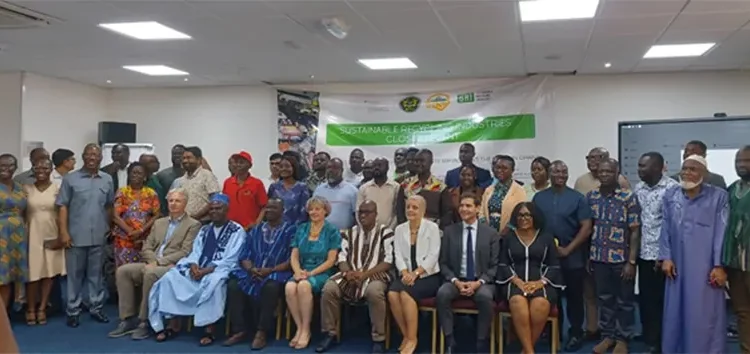Dignitaries in a group photograph at the programme
MINISTER FOR Environment, Science and Technology, Dr. Ibrahim Murtala Mohammed, has pledged the Mahama-led administration’s commitment to addressing the increasing rate of electronic waste (e-waste) in the country.
Dr. Murtala mentioned that e-waste poses a significant environmental risk, stressing that e-waste is more hazardous than other municipal waste streams as it contains potentially harmful chemicals like lead, mercury, bromine, flame, and others that affect the human body.
He added that heavy metals used in mining affects cocoa production, leading to a reduction in the purchase of cocoa from the country, saying, “It is our collective responsibility to ensure that such hazardous substances and heavy metals either through electronic waste or through galamsey or other domestic irresponsible activities engaged by individuals must be dealt with.”
He reiterated that the government is committed to working with global partners to ensure that electronic waste is sustainably managed.
He made these assertions when speaking at the Sustainable Recycling Industries (SRI) programme organised in collaboration with the Ministry of Environment, Science and Technology (MEST), together with the Environmental Protection Authority (EPA). The programme was funded by the government of Switzerland through the State Secretariat for Economic Affairs to promote sustainable e-waste management in Ghana since 2013.
Director for Climate Change and Ozone Department at EPA, Felix Addo Okyireh, explained that the shared goal is to make sustainable e-waste management a norm in Ghana, as well as promote a circular economy in the secondary metals sector.
He stated that sustainable e-waste management is critical to the attainment of the Sustainable Development Goals (SDG), thus preventing environmental pollution, protecting the well-being of communities, and also yielding economic benefits.
“Electrical and electronic equipment is found in every aspect of life due to technological advancement and the speed with which new models emerge, and the short life span of this equipment. The harmful chemicals contained in this equipment, if not managed sustainably, will result in pollution of the environment, air, water, and soil, which will result in serious health effects such as cancer, kidney failure, and respiratory diseases,” he said.
He pointed out that the mandate of the EPA is to regulate and protect the environment, provide for pesticide control and regulation, as well as control the management and disposal of hazardous waste, electrical and electronic waste, and provide for the coordination of climate change and responses to related matters.
He added that the SRI project has supported the country in effectively carrying out the mandate in the e-waste sector through capacity building, policy support, and the development of technical guidelines to support the effective regulation of the sector.
The Swiss Ambassador to Ghana, Togo, and Benin, Simone Giger, applauded the government’s efforts in e-waste management, and urged the country to set an example for other countries on the continent to emulate when it comes to electronic waste.
She added that Switzerland remains committed to supporting Ghana in developing and implementing policies for the programme.
By Florence Asamoah Adom


